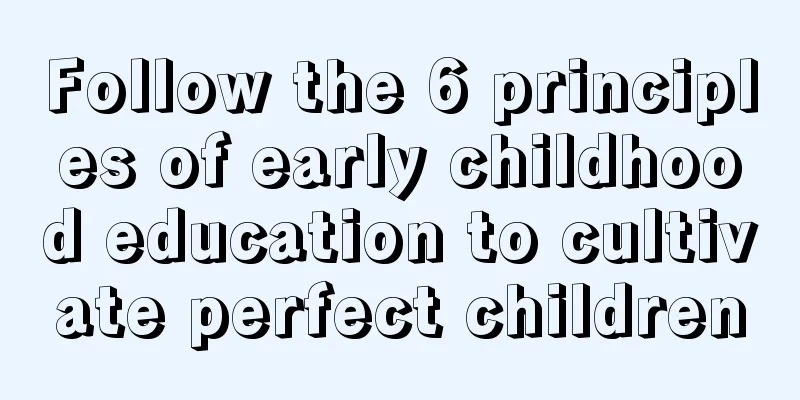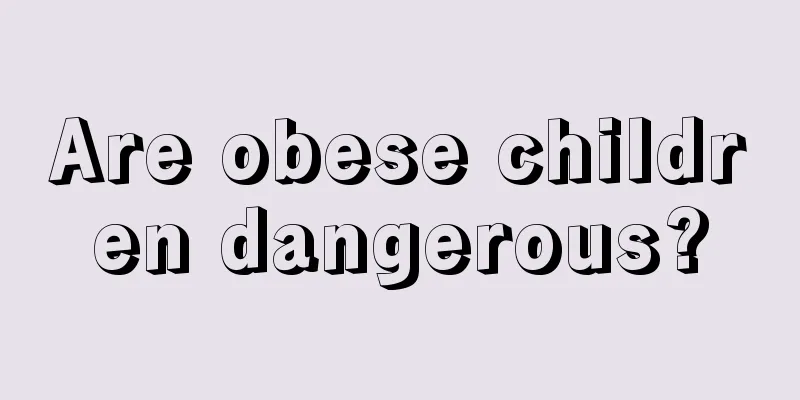Follow the 6 principles of early childhood education to cultivate perfect children

|
Parents place high hopes on their children's early education. Do parents know that there are 6 major principles that can determine their children's future? Please read the early education tips in this article, and parents will know which education their children need most. 1. Principle of starting at 0 years old If prenatal education is classified as eugenics, then early education should start from birth, focusing on comprehensive training and making full use of the most precious golden years of life development from 0 to 6 years old. Because the brain is basically mature by the age of 6, if this growth period is missed, a person's brain power, personality and mind will never have such an opportunity to lay the foundation for healthy mental growth. The purpose of nurturing seedlings is to bear fruit, and the purpose of early education is to produce "giants". Dr. White of the Harvard Graduate School of Education believes that if a three-year-old child is six months or more late in academically related aspects, such as language and problem-solving skills, he will not be able to succeed in his future academic experiences. We must start “snatching” talents from the infant stage and try not to let them perish. As Dr. Doman, director of the Philadelphia Institute for the Development of Human Potential, said: "Every normal baby is born with the potential for genius like Shakespeare, Mozart, Edison, Einstein and others." Don’t ever think that starting early means you can go to school a few years earlier, graduate a few years earlier and start working a few years earlier. If that's all, then you are underestimating the significance of early education and your understanding is still at the doorstep. If it is just for the purpose of "graduating earlier", then why bother letting children enter society early when employment is still difficult in our country? And why bother implementing early education? In short, starting early is to lay the foundation for the quality of the talent, so that he will have a very high starting point and a strong advantage in his future development. 2. Principle of stimulating interest Interest is the primary internal driving force for the mental development and active learning of infants and young children. The formation of correct and strong interests (including broad interests and central interests for a certain period of time) is itself an important part of their psychological development. For most people, interest is the "best teacher", but for infants and young children, interest is almost their "only teacher". Because infants and young children will refuse all education other than what they are interested in. They will close the door of attention to things that do not arouse their interest, block the warehouse of memory, stop thinking and imagination, and may even cry. On the contrary, if a child becomes sensitive to certain things, feels interested in them, and develops a sense of freshness and curiosity, he will be able to gradually memorize, comprehend and master them unconsciously or consciously, regardless of whether they are easy or difficult, important or not, in class or outside of class, and whether he understands them or not. He does not need to "study hard" and can achieve the ideal development precisely like learning his mother tongue. Babies are in a period of non-selective exploration and will be interested in almost everything new, so it is best to make full use of this period to instill knowledge. If he is not indoctrinated with good, he will accept bad; human indoctrination makes him human, and wolf's "indoctrination" makes him a "wolf"; if he is indoctrinated with wandering, he will become a "playboy" or a "leisure princess". 3. Principle of positive suggestion Infants and young children are "strangers" in this world. They lack knowledge, have no opinions, and have no judgment. They are simply influenced by the environment and people's behavior and language. They are animals of the environment, and the environment shapes their personality. Therefore, we must persist in using the environment, behavior and language to positively suggest to children so that they can identify with it and oppose any negative suggestions and influences. We must insist on using positive encouragement as the basic educational method to cultivate their self-esteem, ambition, self-confidence, compassion, etc. to ensure that they develop comprehensively and fully. An important basic principle is to give more encouragement, praise, trust and strict requirements, less criticism and accusations, and prohibit helpless and negative criticism. Always let children feel that they are good children. As for what positive suggestion is, I will explain it in detail in a later lecture. 4. The principle of making things easier There will be many learning difficulties on the road to talent growth. The more difficult the aspects will be in the future, the earlier they should be learned. Let the children get in touch with them in advance to gain a preliminary impression of this aspect, generate interest, and pave the way for future learning. This is the best way to turn difficult things into easy ones and a shortcut to comprehensive and full development. For example, after entering elementary school, everyone feels that learning is difficult. The older you are, the harder it is, and the more advanced the learning, the harder it is. However, "a newborn calf is not afraid of a tiger". Babies are the only ones in the world who are not afraid of difficulties. In their minds, there is only the difference between interest and lack of interest, only the difference between like and rejection, but they have no concept of difficulty and ease, fear and fearlessness. So if it is anything that is difficult to learn in the future, as long as you find a way to arouse your child's interest, he will find it as easy to learn as learning to talk or walk. Is there anything in the world more difficult than learning to listen and speak? If you don’t learn to listen and speak in the first six years of your life, learning later will probably only lead to tragedy; but every three-year-old child can learn so well! Therefore, I believe that the principle of “turning difficulties into ease” is a breakthrough in the development of talent studies and education, and is the secret to cultivating high-quality talents. 5. Living Classroom Principles Rich life and game activities are the best classroom for early education, the only classroom for infants and the main classroom for young children. This is determined by the child's physiological and psychological characteristics. First, their bodies are in the stage of fastest growth and development, and they naturally need to exercise their nerves, bones and muscles, and cannot sit for too long. Second, they are at a stage where unintentional attention is dominant and they are always shifting their attention at any time. They cannot learn according to the textbook chapters using the compulsory method of classroom lectures. Third, for infants and young children, the learning content in life is already too rich. There is information everywhere, fun everywhere, and feelings everywhere. They find the greatest satisfaction in perceiving the world with their five senses, and beneficial play is the most interesting learning, and interesting learning is the happiest play. Therefore, in the classroom of life, if "teachers are rational and intentional, and learners are happy and unintentional", and children are fully guided to experience the knowledge in life, their development will be limitless. For this reason, the national education department requires that early childhood education should "take games as the basic activity and incorporate education into various activities." 6. The principle of giving equal importance to early childhood education at home and education in kindergartens This is a principle that is different from primary and secondary education, and is also determined by the physical and mental characteristics and cognitive laws of infants and young children. From the first day a child comes into the world, he or she is physically disconnected from his or her parents, but is closely connected to them spiritually. The family is his first school and his parents are his first teachers, so we must never underestimate the irreplaceable and important role of family education in early education. Parents are either good teachers or bad teachers; they are either good role models or bad role models, or even "instigators". Educating children is something that no parent can shirk or get rid of. Even if you give your child to someone else, you still have to bear the consequences and responsibilities of "giving it to someone else." In this way, as specialized institutions for early education, nurseries and kindergartens should regard guiding family early education as the other half of their work. The national education department should also implement early education in both families and daycare centers. |
<<: How to answer embarrassing questions children often ask
>>: 7 Early Childhood Education Methods with Advantages and No Disadvantages
Recommend
What should I do if there is a gap between my baby's front teeth?
Every baby is the hope of the family and the futu...
What should young children pay attention to when swimming?
In this hot summer, babies are very uncomfortable...
Is it good for infants and young children to swim frequently?
Many people must have heard that babies have a ce...
Reasons for red anus in babies
If the baby is not properly cared for, various sy...
What characteristics does the baby inherit from his parents?
When looking for a partner, look for someone who ...
Genital standards for seven-year-old boys
There is one thing in the male body that is diffe...
What foods are good for children's stomach and intestines?
The baby's stomach is not in good condition. ...
What to do if your one month old baby doesn't sleep
Various problems of newborns will make their pare...
What to do if your child has trouble falling asleep
Difficulty falling asleep is a common problem for...
How to deal with night sweats in children
The so-called night sweats are the phenomenon of ...
What are the dietary treatments for stomachache in children?
Gastric disease is a disease that troubles many p...
When is the best time for babies to drink juice?
Fruit juice not only tastes delicious, but also h...
What is the reason why a one and a half year old baby cannot sleep well at night?
For adults, sleep helps restore physical energy, ...
How to guide children to have a good nap
Children are still young, and their bodies need t...
What to do if your child has red and swollen gums
The health of our gums is very important to us. I...









